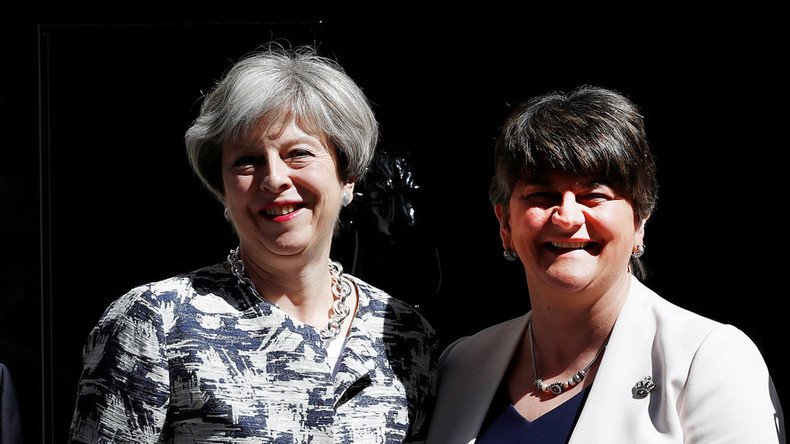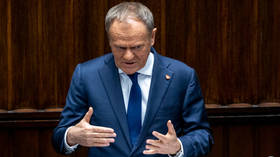‘Where’s your magic money tree?’ Theresa May faces backlash over £1bn ‘bung’ to DUP

UK Prime Minister Theresa May’s billion-pound deal with the Democratic Unionist Party (DUP) to prop up her minority government has been branded “shabby and reckless,” leaving many to wonder whether the funds grew on a “magic money tree.”
The DUP’s 10 MPs will support the Tories in key Commons votes in areas such as the Queen’s Speech, the Budget, and Brexit, in exchange for £1 billion ($1.27 billion) of new funding for Northern Ireland, plus more flexibility on almost £500 million of previously announced funds in infrastructure, health, and education.
Negotiations between the parties lasted 18 days after the general election on June 8 resulted in a hung parliament. After talks with DUP leader Arlene Foster at Downing Street, the prime minister said the two parties “shared many values” and the agreement was “a very good one.”
The agreement has prompted calls for more money for Wales and Scotland. Welsh First Minister Carwyn Jones called the deal a “straight bung to keep a weak prime minister and a faltering government in office” and said it “kills the idea of fair funding.”
The Scottish National Party’s (SNP) leader at Westminster, Ian Blackford, said Scotland should get “its fair share.”
“For years the Tories have been cutting budgets and services, but suddenly they have found a magic money tree to help them stay in power,” he added.
Labour criticized the deal as “shabby and reckless” and said it would undermine trust in the UK government’s impartiality, which was vital to the implementation of the Good Friday agreement.
Speaking in the House of Commons, Shadow Foreign Secretary Emily Thornberry said: “Can the First Secretary tell us this. Where is the extra £1 billion coming from? He was fond of telling interviewers there was no magic money tree.
“So what has happened? Has he found a key to the secret garden? Or is the truth that like everything this government says and does it can all be ditched if it helps them hang onto power, no matter the bedfellows, no matter what the manifesto said, no matter where the money comes from, no matter the unfairness for the rest of Britain, and no matter the consequences for peace.
“That is no way to lead a government and it is definitely no way to run a country.”
Former Chancellor of the Exchequer George Osborne used the Evening Standard, which he now edits, to mock May as being under the control of Foster.
The newspaper depicted the PM as the Austin Powers character Mini-Me.
And here's our second edition @EveningStandard ..... pic.twitter.com/Z2MRUISCDz
— George Osborne (@George_Osborne) June 26, 2017
Many have taken to social media to criticize the deal, asking how the Tories have managed to find spare cash when the “NHS is in crisis” and “Britain’s schools are crumbling.”
Theresa May to a nurse who hasn't had a pay rise in 8yrs: "there's no magic money tree"
— Fiona Rutherford (@Fi_Rutherford) June 26, 2017
May to DUP: Here's £1.5 billion so I can keep my job
PICTURED: Government begins removal of any evidence of dinosaurs from the UK following deal with the DUP. pic.twitter.com/xdjkNAUsX6
— The DM Reporter (@DMReporter) June 26, 2017
How to spend a billion pounds
— Dai Lama (@WelshDalaiLama) June 26, 2017
❌Hospitals
❌Teachers
❌Police
❌Firefighters
✅A bribe to ensure the political support of just 10 people
#dupcoalition
— Trumpton (@Trump_ton) June 26, 2017
New bus is ready to tour Greatish Brexitland pic.twitter.com/4zeVo6S6Ty
Food £200
— Ahir Shah (@AhirShah) June 26, 2017
Data £150
Rent £800
Homophobia £1bn
Utility £150
someone who is good at politics please help me budget this. my country is dying
Defense Secretary Michael Fallon has rejected the idea that the extra funding to Northern Ireland is a “bung,” arguing it is necessary for a more deprived part of the UK.
“Let’s be clear – we all have an interest in the future prosperity and security of the province,” he told BBC Radio 4.
“This is £1 billion that will go to improving some investment, improving the infrastructure of the province, growing the private economy of the province, ensuring its employment rate – which is behind Wales and Scotland – catches up.
“We all as taxpayers, wherever we are, in England, Wales and Scotland, we all have an interest in Northern Ireland doing better.”













